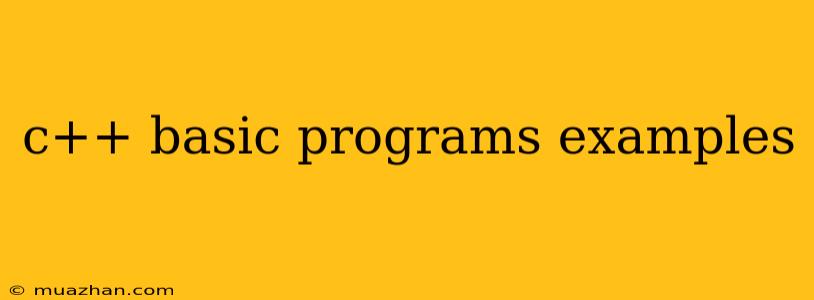C++ Basic Programs Examples
This article will guide you through several basic C++ programs, illustrating fundamental concepts and providing a foundation for your journey in C++ programming.
1. Hello World!
The classic starting point for any programming language. This program simply displays "Hello World!" on the screen.
#include
int main() {
std::cout << "Hello World!" << std::endl;
return 0;
}
Explanation:
- #include <iostream>: This line includes the
iostreamlibrary, which provides input and output functionalities likestd::coutfor printing to the console. - int main(): This is the main function, the program's starting point.
- std::cout << "Hello World!" << std::endl;: This line prints the string "Hello World!" to the console.
std::endlinserts a newline character, moving the cursor to the next line. - return 0;: This line indicates successful program execution.
2. Adding Two Numbers
This program takes two numbers as input from the user, adds them, and then displays the result.
#include
int main() {
int num1, num2, sum;
std::cout << "Enter two numbers: ";
std::cin >> num1 >> num2;
sum = num1 + num2;
std::cout << "Sum of the two numbers is: " << sum << std::endl;
return 0;
}
Explanation:
- int num1, num2, sum;: Declares three integer variables to store the input numbers and their sum.
- std::cin >> num1 >> num2;: Reads two numbers from the user's input and stores them in
num1andnum2. - sum = num1 + num2;: Calculates the sum of the two numbers.
- std::cout << "Sum of the two numbers is: " << sum << std::endl;: Prints the result to the console.
3. Finding the Largest Number
This program takes three numbers from the user and determines the largest among them.
#include
int main() {
int num1, num2, num3, largest;
std::cout << "Enter three numbers: ";
std::cin >> num1 >> num2 >> num3;
largest = num1; // Assume the first number is the largest initially
if (num2 > largest) {
largest = num2;
}
if (num3 > largest) {
largest = num3;
}
std::cout << "The largest number is: " << largest << std::endl;
return 0;
}
Explanation:
- largest = num1;: Initially assumes the first number (
num1) is the largest. - if (num2 > largest) ...: If the second number (
num2) is greater than the currentlargest, it becomes the newlargest. - if (num3 > largest) ...: Same logic applied for the third number (
num3).
4. Factorial Calculation
This program calculates the factorial of a given number using a loop.
#include
int main() {
int num, factorial = 1;
std::cout << "Enter a number: ";
std::cin >> num;
for (int i = 1; i <= num; i++) {
factorial *= i;
}
std::cout << "Factorial of " << num << " is: " << factorial << std::endl;
return 0;
}
Explanation:
- int num, factorial = 1;: Declares variables to store the input number and its factorial.
- for (int i = 1; i <= num; i++) { ... }: Iterates from 1 to the input number (
num). - factorial *= i;: Multiplies the current
factorialvalue with the loop counter (i) in each iteration.
5. Checking Prime Number
This program determines if a given number is prime or not.
#include
#include // For sqrt() function
int main() {
int num;
bool isPrime = true;
std::cout << "Enter a number: ";
std::cin >> num;
if (num <= 1) {
isPrime = false;
} else {
for (int i = 2; i <= sqrt(num); i++) {
if (num % i == 0) {
isPrime = false;
break;
}
}
}
if (isPrime) {
std::cout << num << " is a prime number" << std::endl;
} else {
std::cout << num << " is not a prime number" << std::endl;
}
return 0;
}
Explanation:
- bool isPrime = true;: Initializes a boolean variable to assume the number is prime by default.
- if (num <= 1) ...: Handles cases where the input is less than or equal to 1 (not prime).
- for (int i = 2; i <= sqrt(num); i++) { ... }: Iterates from 2 up to the square root of the input number.
- if (num % i == 0) ...: If the number is divisible by any number in the loop, it's not prime, and
isPrimeis set tofalse. - if (isPrime) ...: Prints the result based on the
isPrimevalue.
These basic programs demonstrate essential C++ concepts like data types, variables, input/output, control flow (if-else, for loop), and arithmetic operations. They serve as a solid foundation for building more complex C++ programs.
